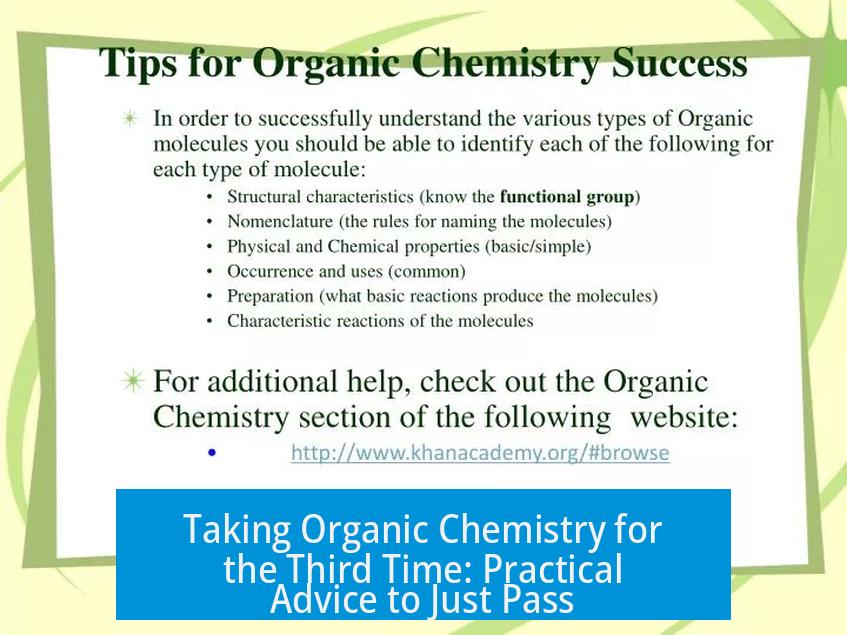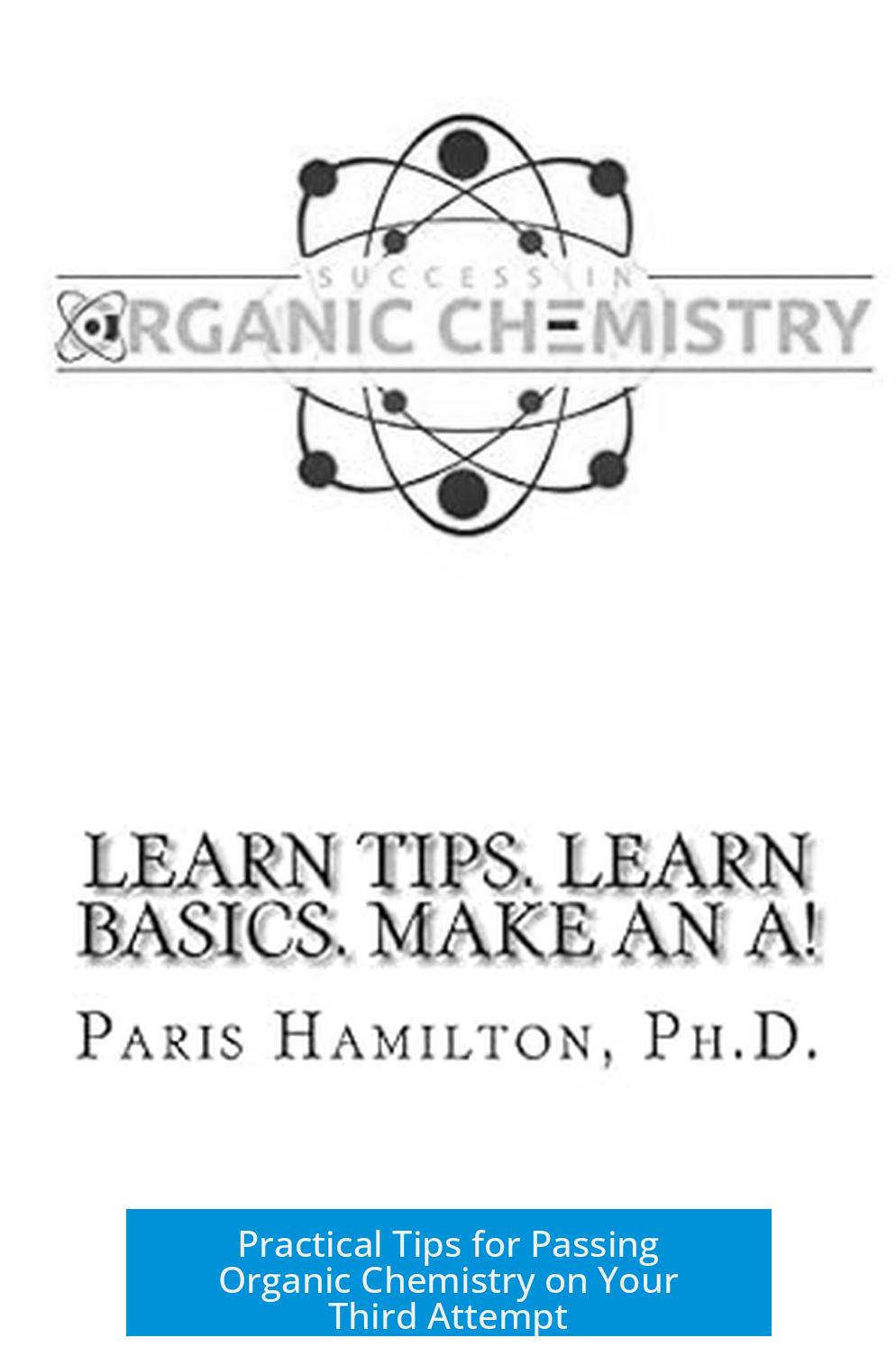Taking Organic Chemistry for the Third Time: Practical Advice to Just Pass

Organic chemistry (Ochem) can challenge many students multiple times. When attempting the course for the third time, a strategic, honest, and focused approach becomes essential. The goal shifts from mastering every detail to understanding enough to pass with confidence. This article lays out concrete advice tailored for students retaking Ochem who want to pass efficiently.
1. Embrace an Honest and Conceptual Learning Approach

The first key is honesty about learning habits. Avoid rote memorization, which often leads to confusion. Instead, focus on conceptual understanding. Grasp why reactions occur and what the underlying principles are. This approach minimizes random memorization and enhances long-term retention.
For example, treat mechanisms not as fixed routines to memorize, but as problems needing solutions. Each step corresponds to a reaction challenge solved by applying specific reagents. When you understand the “why” behind each step, the “what” (such as reagents and conditions) becomes easier to remember.
- Stop memorizing reactions blindly.
- Ask yourself why a reaction proceeds in a certain way.
- Link reagents to the reaction problems they solve.
2. Use Visualization and Recognize Patterns
Mechanism mastery often hinges on recognizing patterns. Consider how molecules look and which groups are attached. Visualizing functional groups and their electronic effects helps predict reactivity.
Identifying visual and reactive patterns aids memory. For example, knowing how nucleophiles and electrophiles typically behave lets you anticipate the role of reagents. Continuous practice with these patterns makes recalling reagents and mechanisms more intuitive.
- Practice visualizing molecules and reaction sites.
- Identify recurring motifs in reaction mechanisms.
- Question “What role does this reagent play?” and “Why does this happen?”
3. Use the Right Study Resources and Tools
Broadening resources can clarify concepts and support varied learning styles. Videos, flashcards, textbooks, and a well-kept journal can improve understanding and recall.
- Watch well-regarded video series like Chad’s Videos or The Organic Chemistry Tutor for clear examples.
- Create flashcards focused on mechanisms and key concepts.
- Work alongside the course textbook and solutions manual to practice problems and verify answers.
- Summarize key points by rewriting textbook or lecture content in a study journal.
- Look for blank mechanism worksheets online to practice freehand.
This multi-resource approach allows facts to solidify from different angles. Actively engage with material rather than passively reading.
4. Practice Relentlessly and Build Persistence
Passing organic chemistry on a third attempt requires committed practice. Consistent problem-solving improves familiarity and confidence. Every problem helps connect theory to practical application.
Try to work on some problems ahead of schedule to increase exposure. Analyze why incorrect answers happened—this boosts learning more than knowing something right immediately.
Remember, repetitive practice turns reaction mechanisms into second nature. Persistence breaks through initial confusion and frustration.
- Practice as much as possible across varied question types.
- Review old exams and quizzes for patterns in mistakes.
- Push through hard sections instead of avoiding them.
- Accept that understanding comes incrementally; patience matters.
5. Leverage Professors and Seek Targeted Help
Your professor is a critical resource. Establish a relationship early and seek help actively. Use office hours to review old tests and discuss progress.
Ask about weak areas and how to improve. Professors can offer insights into the exam style and suggest tailored study strategies.
- Schedule in-person meetings to discuss past exams.
- Mark confusing topics and clarify them directly.
- Use professors as guides rather than trying to self-teach difficult parts alone.
6. Strengthen Foundational Chemistry Knowledge
Many students retaking Ochem lack solid general chemistry basics. Review resonance structures, Lewis dot diagrams, and hybridization concepts thoroughly. These fundamentals underpin understanding of organic mechanisms and reactivity.
Failing to grasp these basics often causes organic chemistry to appear more complex than necessary. Reinforce these concepts alongside your organic chemistry review.
- Review Electron distribution, bond types, and molecular geometry.
- Practice drawing accurate resonance structures.
- Understand how orbital hybridization affects molecular shape and reactivity.
7. Maintain a Balanced Mental and Emotional Perspective
Organic chemistry challenges most students. Accept that struggle is a normal part of the process. Avoid comparing yourself to peers; many also find it difficult but do not show it.
Encourage persistence and positive self-talk. Remind yourself that others with similar challenges have succeeded. Confidence can build through gradual progress.
- Accept struggle as normal; don’t feel alone.
- Ignore peer pressure and focus on your unique learning path.
- Use incremental gains as motivation to continue.
8. Explore Additional Channels and Materials
Diverse study material can fill gaps and provide fresh perspectives:
- The Animated Chemistry Textbook offers visual explanations of concepts.
- Organic Chemistry lectures online can supplement your coursework.
- Jakob Fredlos’s book Organic Chemistry Maximum Success Minimum Effort is an affordable guide with a clear approach.
Try different formats until one helps you understand tricky topics better.
Summary: Practical Takeaways for Passing Ochem on Third Attempt
- Study Conceptually: Focus on understanding why reactions happen, not just memorizing.
- Visualize Patterns: Learn to spot molecular and reactive patterns for easier recall.
- Use Multiple Resources: Supplement textbooks with videos, flashcards, and practice sheets.
- Practice Consistently: Commit to daily problem solving and keep revisiting mistakes.
- Seek Help: Use professors and office hours as key support tools.
- Review Basics: Strengthen general chemistry foundation including resonance and hybridization.
- Stay Positive: Accept struggles, avoid comparisons, and encourage persistence.
- Expand Materials: Use recommended online channels and books for alternative explanations.
Taking Ochem for the Third Time and Just Want to Pass! Any Advice?
You’re not alone if you’re staring down Organic Chemistry for the third time and thinking, “I just want to pass this thing!” The key to finally conquering orgo isn’t brute force memorization—it’s about embracing honest learning, understanding the *why*, practicing smartly, and using every tool and resource you can get your hands on.
Let’s unpack a game plan that combines hard truths, practical advice, and a sprinkle of humor to help you *finally* pass that infamous course.
1. Be Honest with Yourself and Learn Conceptually, Not Just Memorize
Here’s a bitter pill but a true one: if you’re relying on rote memorization, you’re headed for trouble. Many students struggle because they cram reaction mechanisms without grasping the underlying principles. You can’t just memorize your way past orgo.
Instead, focus on *why* reactions happen. Try to understand the logic behind mechanisms and reagents. For example, mechanisms aren’t dance routines to memorize—they’re like puzzles where each reagent fixes a specific issue. When you get good at recognizing these “problems,” recalling the reagents becomes natural.
If you find yourself sighing into a flashcard for the fifth time, pause and ask, “Why does this reagent do what it does?” This honest approach—that brutal self-reflection—is the foundation of passing organic chemistry.
2. Use Visualization and Spot Patterns
Organic chemistry screams “visual learner.” Your brain loves visuals and patterns, especially when dealing with molecule structures and mechanisms.
Try to spot recurring visual and reactive patterns. What groups are attached? How does their presence affect reactivity? Ask yourself, “What did this reagent do here? Why?” Over time, these questions build a mental library that makes recalling reagents and mechanisms easier.
Imagine mechanisms as a story told through shapes and arrows. When you see a carboxyl group, your pattern recognition should flag common reactions. This skill grows with practice but makes the whole thing less terrifying.
3. Leverage Recommended Resources and Study Tools
Don’t reinvent the wheel. Tons of awesome resources can clarify confusing topics and cement your understanding.
- Video Lessons: Platforms like The Animated Chemistry Textbook and The Organic Chemistry Tutor offer clear, step-by-step concept explanations. Re-watching these can help you “see” tricky mechanisms in a fresh way.
- Flashcards: Use flashcards not to memorize blindly but to reinforce conceptual facts. If something doesn’t make sense conceptually, the flashcard won’t help much.
- Textbook and Solutions Manual: Your textbook should be your bible. Read it actively. Summarize tough sections in a journal. Work through problems with the solutions manual to check your understanding.
- Blank Mechanism Worksheets: Find or print blank mechanism sheets online. Practice sketching out reactions from scratch. Repetition here is gold.
These tools aren’t magic, but combined with honesty and effort, they make a powerful team.
4. Practice Relentlessly and Don’t Give Up
Organic chemistry demands practice. Period.
Even if your goal is just to pass, practicing will build fluency. Work on problems beyond your current lecture. Preview upcoming reactions and try “brute force” problem-solving to deepen understanding.
Each time you get a question wrong, don’t despair—use it as a stepping stone. Ask yourself, “Why was I wrong? What knowledge was missing?” Persistence is key. As one OCHEM professor famously said, “It’s going to be hell, but one day it will click and finally make sense.”
Remember: almost everyone struggles. You’re in good company. Keep pushing, keep practicing, keep believing.
5. Make Your Professor Your Ally
Professors aren’t monsters; they’re your best resource.
Use office hours actively. Bring your old exams and quizzes. Ask for feedback—what can you improve? What did you miss? Professors have decades of experience seeing students struggle and can provide insight that no textbook or video can.
Don’t be shy—ask questions. If something doesn’t make sense, mark it and get clarification ASAP. Your professor can clarify misconceptions before they harden into mental roadblocks.
6. Reinforce Foundational General Chemistry Knowledge
Sometimes orgo’s challenges stem from shaky basics. Are you solid on resonance, Lewis structures, and hybridization? These Gen Chem concepts are the building blocks of organic chemistry.
If any of these fundamentals are fuzzy, take some time to shore them up. It’ll save you headaches in the long run.
7. Manage Your Mental Game
OChem is nerve-wracking. Everyone struggles. Accept it and don’t lose confidence.
Are your classmates acing it? Don’t compare. Chances are they don’t have it all figured out either.
Your mindset matters. Encourage yourself. Celebrate small wins. When frustration hits, remind yourself that persistence trumps talent here.
8. Consider Additional Materials and Channels
Beyond textbooks and traditional videos, explore alternative resources:
- The Animated Chemistry Textbook gives a different semi-humorous take on concepts.
- The book Organic Chemistry Maximum Success Minimum Effort by Jakob Fredlos offers a less conventional approach. It’s budget-friendly and great for organizing your thoughts.
- Online lectures like these can also provide different teaching styles that might resonate better with you.
Summary: Your Personalized Roadmap to Passing OChem at Last
Taking OChem for the third time is daunting, but you can beat it. Drop the idea that you must memorize reactions. Instead, embrace honesty and focus on understanding why things happen.
Practice relentlessly with the right resources—videos, textbooks, flashcards, blank worksheets. Use your professor as a guide and never be afraid to ask questions. Reinforce your basic chemistry knowledge. Visualize patterns. Most importantly, adopt a positive and persistent mindset.
This journey won’t be a breeze, but it’s doable. Remember, it’s not about brilliance, it’s about grit. With a smart, humble approach, that third time can be your charm.
So, grab your notebook, open that textbook, and attack OChem with renewed strategy—you’ve got this!
How can I stop relying on memorization and really understand organic chemistry?
Focus on why reactions happen, not just how. Learn the problems each reaction solves and how reagents fix them. Understanding this leads to natural memorization.
What’s the best way to remember reaction mechanisms and reagents?
Look for visual patterns in molecules and recognize reactive groups. Asking “what does this reagent do?” helps build pattern recognition, making recall easier.
Are there specific resources I should use when retaking orgo?
Use videos like Chad’s Prep and Organic Chemistry Tutor. Work alongside your textbook and solutions manual. Make flashcards and rewrite notes in a journal to reinforce concepts.
How important is practicing problems repeatedly when trying to just pass?
Practice is key. Keep working on problems, even from future topics. Analyze mistakes carefully. Over time, reactions will feel natural and clearer.
Should I ask my professor for help during my third attempt?
Yes. Make your professor a key ally. Use office hours to review past tests and get feedback. Asking for clarification can reveal gaps you might miss alone.





Leave a Comment